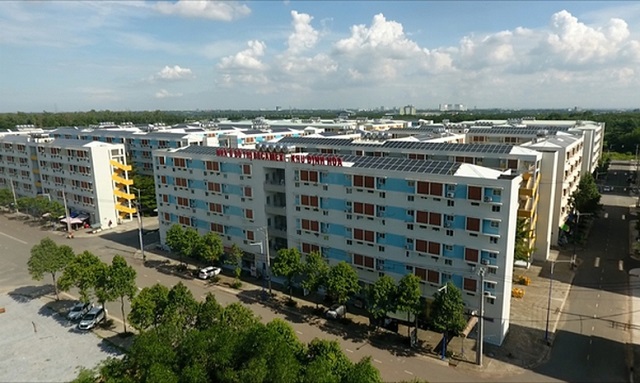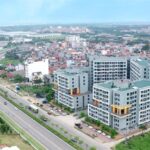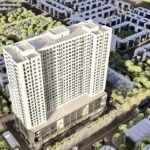
A social housing project for workers in industrial parks in Binh Duong – Photo: VGP
|
Providing More Housing Opportunities for Millions of Workers
According to Dr. Nguyen Van Dinh, Vice President of the Vietnam Real Estate Association, Vietnam has witnessed the remarkable growth of the real estate market during its rapid economic development and urbanization.
However, this growth has been uneven, leading to a severe shortage of social housing, especially rental housing with good quality and affordable prices for workers.
The reality in many industrial parks in Vietnam shows that there is still a serious lack of housing for workers. This has led to workers having to find accommodation on their own, which often lacks quality and negatively affects their lives and work efficiency.
In this context, the development of the National Housing Fund, especially social housing and rental housing, is a correct and urgent policy. Over the past decades, Vietnam has made significant achievements in economic development and urbanization. However, the housing fund, especially social housing and affordable rental housing, has not yet met the needs of workers. In industrial parks, workers often have to rent rooms with inadequate living conditions, lacking safety and hygiene.
“This not only affects the health and morale of workers but also reduces productivity and work efficiency,” analyzed Dr. Nguyen Van Dinh.
Dr. Vo Tri Thanh, Director of the Institute for Brand and Competition Development Research, said that real estate prices in large cities are continuously increasing, putting great pressure on homeownership, especially for low-income earners.
In this context, the establishment of the National Housing Fund is considered a breakthrough solution, offering housing opportunities for millions of people. The National Housing Fund will not only help people access suitable housing but also contribute to regulating the real estate market and curbing speculation, thereby promoting sustainable economic growth.
The National Housing Fund model is feasible for Vietnam. However, to ensure long-term effectiveness, it needs to be designed to fit the market characteristics and domestic financial resources.
Dr. Nguyen Van Dinh believes that the reality shows that the real estate market is developing out of sync, with a serious lack of social housing and rental housing. The establishment of the National Housing Fund will help address the housing needs of policy beneficiaries and low-income workers, ensuring social security and creating conditions for people to “settle down and do their jobs.” At the same time, it will contribute to economic development, especially in industrial parks, large cities, and addressing the supply-demand imbalance, ensuring the sustainability of the real estate market.
Many workers in industrial parks are excited about the proposed National Housing Fund. For them, this means more opportunities to access and improve their living conditions while working, as the current social housing projects cannot meet the demand, and commercial housing projects are too expensive.
“This is delightful news for us workers. We hope that the National Housing Fund, when operational, will provide more opportunities for low-income earners like us to access affordable housing with the support of the state and society,” shared Ms. Trinh Thi Huyen, a worker at the Bac Thang Long Industrial Park in Hanoi.
Need for a ‘conductor’ to coordinate and responsibility from multiple parties
To solve the equation of the National Housing Fund, Dr. Nguyen Van Dinh believes that mobilizing resources from multiple parties is inevitable. Firstly, the state needs to have a clear land planning and fund for housing development.
Effective use of public land, along with preferential policies, will facilitate the construction of housing projects that meet the needs of the people.
However, resources should not only come from the state but also from the contributions of workers through a small portion of their salaries going into the National Housing Fund. This solution has a high level of socialization and shows the responsibility of individuals to the community.
At the same time, real estate businesses also need to have social responsibility in developing social housing. By allocating a portion of their profits from commercial housing projects to build social housing or rental housing, they can contribute to solving the housing problem for low-income workers.
“Especially, industrial parks need to take responsibility for building housing for their workers. Leaving this issue to the local government has caused many negative impacts on social security, the environment, and security. Enterprises need to participate in developing urban infrastructure, housing infrastructure, and commercial services or contribute financially so that the state can implement these projects,” shared Dr. Nguyen Van Dinh.
Dr. Vo Tri Thanh added that the state needs to play a central role in establishing, coordinating, and operating the National Housing Fund while encouraging the participation of other economic components to optimize resources.
The National Housing Fund will focus on providing housing at preferential prices through sales or rentals to target groups such as industrial park workers, freelance workers, officials, public employees without stable housing, and young families facing financial difficulties.
According to Dr. Vo Tri Thanh’s analysis, a strict approval and supervision mechanism is crucial to ensure efficiency, transparency, and prevent leakage, as well as to ensure that the capital reaches the right beneficiaries.
“If well implemented, the National Housing Fund model can become an important solution, helping millions of people access reasonably priced housing and contributing to the stable and sustainable development of the real estate market,” Dr. Vo Tri Thanh expected.
– 15:00 25/03/2025
The Capital’s Commitment: Commencing Construction on Two Affordable Housing Mega-Projects
The Hanoi People’s Committee has instructed relevant departments to expedite the development of two social housing projects, Tien Duong 1 and Tien Duong 2, in the Dong Anh district. Emphasizing the importance of efficient procedures, the committee has urged the implementation of a “green channel” approach to facilitate construction, aiming for a groundbreaking commencement in September.
The Green Revolution: CEO Summit 2025 and the Evolution of Vietnam’s Real Estate Market
The CEO Summit 2025, hosted by Dat Xanh Group, brought together almost 200 leading real estate brokers. The event, held in a warm and elegant setting, served as a platform for large distribution companies to gain insights and strategize for the market. It marked a significant step forward in the collaboration between Dat Xanh and its nationwide distribution system for the upcoming period.
The Pilot Project: Empowering Investors to Spearhead Social Housing Initiatives Without Bidding Red Tape
“The investor selection process prioritizes experienced investors with strong financial capabilities, who can demonstrate a track record of swift project implementation and significant contributions towards advance compensation funding.”





















